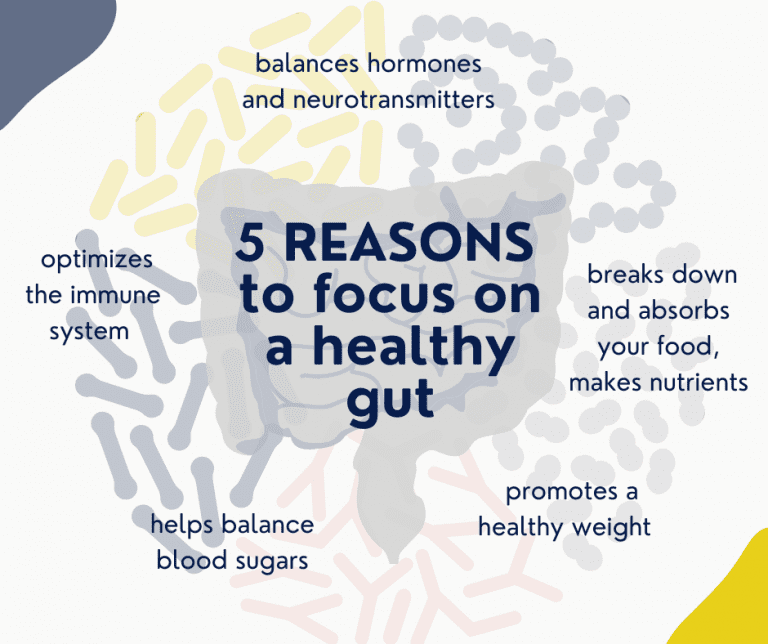Balances hormones and neurotransmitters
Your gut bacteria make important byproducts that our bodies use! It helps give us nutrition, balance hormones and support brain function.
The gut helps detoxify hormones from the body. Once estrogen is produced and makes the full circuit, it goes to the liver, where it is inactivated. It then travels to the gut, and in an unhealthy gut, bad bacteria make an enzyme called beta-glucuronidase which re-activates estrogen. Most of the estrogen then returns to circulation, contributing to conditions such as estrogen dominance.
In regards to brain function, certain species of bacteria can help produce chemicals in the brain called neurotransmitters. For example, serotonin is an antidepressant neurotransmitter that’s mostly made in the gut. It is also important to note that the gut is physically connected to the brain through millions of nerves. Therefore, the gut microbiome may also affect brain health by helping control the messages that are sent to the brain through these nerves.
You are what you absorb (not just what you eat)
Gut bacteria actually break down our foods into smaller molecules that we can absorb and utilize. Some of the bacteria byproducts are actually nutrients that we need, like B12.
When you eat, only a small portion of nutrients are absorbed through the walls of your stomach. A majority of the work occurs in your small intestine. Here, your gut breaks down these nutrients necessary for your body to thrive. The gut bacteria produces enzymes that help break down indigestible carbohydrates. With the wrong bacteria, not enough bacteria or insufficient enzymes, your food particles are not available for the good bacteria to flourish, nor able to get past the gut lining and into our cells for energy.
Your gut is your first line of defense for invaders!
In a healthy gut, inflammation comes and goes. It’s a necessary tool that the immune system uses to combat pathogens and promote healing in the body. Pro-inflammatory chemicals take care of the problem, then anti-inflammatory chemicals return everything back to normal. This is because the gut microbiome and the immune system work together, stimulating and modulating each other. In other words, a balanced immune response requires a balanced microbiome.
One way good bacteria modulate the immune system is by fermenting undigestible carbohydrates into short chain fatty acids such as butyrate. Butyrate then increases production of anti-inflammatory immune cells called T regulatory cells. It’s important to have enough of these T regulatory cells because they keep the immune system from overreacting.
Balancing blood sugars is a key to metabolism
Did you know that when people eat the exact same foods, their blood sugar could vary greatly from person to person. This is partially due to the types of bacteria in their gut!
Gut microbiota can help prevent and control blood sugar metabolism disorders by targeting multiple pathways in the intestine, liver, and pancreas. These pathways can tip the balance in favor of improved gut health, glycemic control, lipid profile, insulin resistance, and reduced inflammation.
In diseased states, there are changes in the mucosal, physical, and chemical barriers that separate the gut microbiome from the host. Such alterations can affect the relationship between the microbiome and blood sugar. For example, people with diabetes have dysbiosis, where the gut bacteria comprise more gram-negative bacteria and less beneficial bifidobacteria compared to healthy individuals.
Gut bacteria promote a healthy weight!
Certain bacteria actually promote obesity. In an imbalanced gut microbiome, these bacteria produce more methane, which slows motility of the digestive tract. This slower transit time increases risk of constipation — and also allows the gut to extract more calories from food. Therein lies at least part of the problem.
If an individual is already eating poorly, bad bacteria feed off these highly processed, sugary foods and thrive in the inflammatory environment created by them. These bacteria can actually send signals to the brain, demanding more of this junk food!
The gut lining is full of receptors that modulate the “hungry” and “full” hormones, thus regulating healthy appetite and satiety as well.


